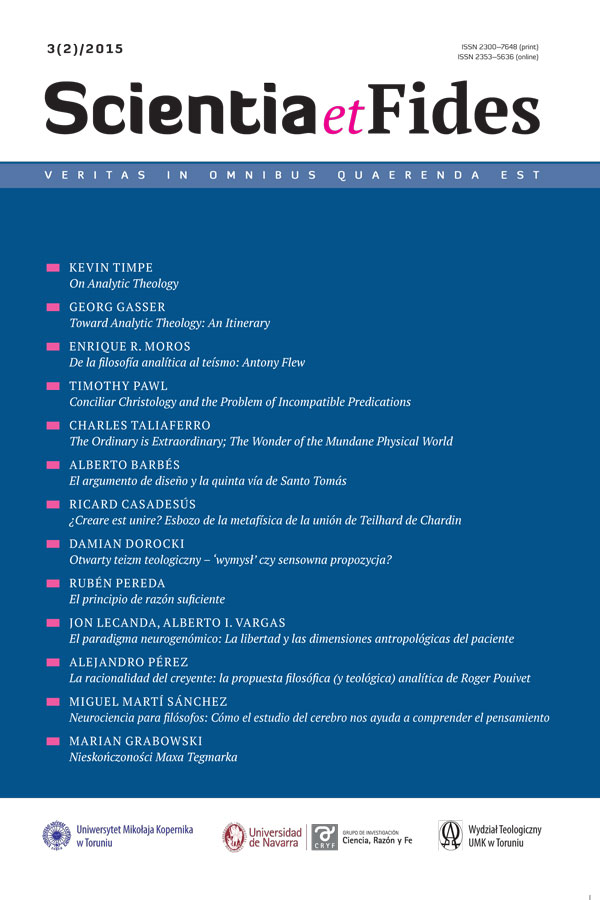On Analytic Theology
Keywords
analytic theology, philosophical theology, systematic theology, analytic philosophyAbstract
My primary aims in this paper are to give an overview of a recent movement which goes by the name of ‘analytic theology’, to locate that movement within the larger context of contemporary philosophy of religion, and to identify some of the weakness or objections that analytic theology will need to address moving forward. While I think that some of these objections have merit, I also think that the promise of analytic theology’s contribution to theology more broadly is, in my view, sufficiently robust that we should continue to engage in it as a theological enterprise (even if one among many).
References
Abraham, William J. 2009. “Systematic Theology as Analytic Theology.” In Analytic Theology: New Essays in the Philosophy of Theology, edited by Oliver D. Crisp and Michael C. Rea, 54—69. Oxford: Oxford University Press.
Abraham, William J. 2013. “Response to Marc Cortez.” Journal of Analytic Theology 1 (1): 26–29. DOI: 10.12978/jat.2013-1.220812000112b
Abraham, William J. 2013. “Turning Philosophical Water into Theological Wine.” Journal of Analytic Theology 1 (1): 1–16. DOI: 10.12978/jat.2013-1.220812000112a
Cortez, Marc. 2013. “As Much as Possible: Essentially Contested Concepts and Analytic Theology: a Response to William J. Abraham. Journal of Analytic Theology 1 (1): 17–24.
Freundlieb, Dieter and Wayne Hudson. 1998. “Convergence and its Limits: Relations between Analytic and Continental Philosophy.” Philosophical Explorations 1 (1): 28–42.
Harris, Harriet A. 2005. “Does Analytical Philosophy Clip our Wings? Reformed Epistemology as a Test Case.” In Faith and Philosophical Analysis: The Impact of Analytical Philosophy on the Philosophy of Religion, edited by Harriet A. Harris and Christopher J. Insole, 100—118. Burlington, VT: Ashgate.
Harris, Harriet A. and Christopher J. Insole. 2005. “Verdicts on Analytic Philosophy of Religion.” In Faith and Philosophical Analysis: The Impact of Analytical Philosophy on the Philosophy of Religion, edited by Harriet A. Harris and Christopher J. Insole, 1—20. Burlington, VT: Ashgate.
Levy, Neil. 2003. “Analytic and Continental Philosophy: Explaining the Differences.” Metaphilosophy 34 (3): 284–304.
MacDonald, Scott. 2009. “What is Philosophical Theology?” In Arguing about Religion, edited by Kevin Timpe, 21—32. New York: Routledge.
Mitchell, Basil. 2005. “Staking a claim for metaphysics.” In Faith and Philosophical Analysis: The Impact of Analytical Philosophy on the Philosophy of Religion, edited by Harriet A. Harris and Christopher J. Insole, 21—32. Burlington, VT: Ashgate.
Rauser, Randal. 2009. “Theology as a Bull Session.” In Analytic Theology: New Essays in the Philosophy of Theology, edited by Oliver D. Crisp and Michael C. Rea, 70—685. Oxford: Oxford University Press.
Rea, Michael C. 2009. “Introduction. In Analytic Theology: New Essays in the Philosophy of Theology, edited by Oliver D. Crisp and Michael C. Rea, 1—30. Oxford: Oxford University Press.
Stump, Eleonore. 1993. “Introduction”. In Reasoned Faith: Essays in Philosophical Theology in Honor of Norman Kretzmann, edited by Eleonore Stump, 1—11. Ithaca, NY: Cornell University Press.
Stump, Eleonore. 2010. Wandering in Darkness. Oxford University Press.
Stump, Eleonore. 2013. “Athens and Jerusalem: The relationship of philosophy and theology.” Journal of Analytic Theology 1 (1): 45–59. DOI: 10.12978/jat.2013-1. 041104181915a
Swinburne, Richard. 2005. “The Value and Christian Roots of Analytical Philosophy of Religion.” In Faith and Philosophical Analysis: The Impact of Analytical Philosophy on the Philosophy of Religion, edited by Harriet A. Harris and Christopher J. Insole, 33—45. Burlington, VT: Ashgate.
Timpe, Kevin. 2013. Free Will in Philosophical Theology. Bloomsbury.
Torrance, Alan J. 2013. “Analytic Theology and the Reconciled Mind: the Significance of History.” Journal of Analytic Theology 1 (1): 3–44. DOI: 10.12978/jat.2013-1.001113191404a
Wolterstorff, Nicholas. 2009. “How Philosophical Theology Became Possible within the Analytic Tradition in Philosophy.” In Analytic Theology: New Essays in the Philosophy of Theology, edited by Oliver D. Crisp and Michael C. Rea, 155—169. Oxford: Oxford University Press.
Downloads
Published
How to Cite
Issue
Section
License
CC BY ND 4.0. The Creator/Contributor is the Licensor, who grants the Licensee a non-exclusive license to use the Work on the fields indicated in the License Agreement.
- The Licensor grants the Licensee a non-exclusive license to use the Work/related rights item specified in § 1 within the following fields: a) recording of Work/related rights item; b) reproduction (multiplication) of Work/related rights item in print and digital technology (e-book, audiobook); c) placing the copies of the multiplied Work/related rights item on the market; d) entering the Work/related rights item to computer memory; e) distribution of the work in electronic version in the open access form on the basis of Creative Commons license (CC BY-ND 3.0) via the digital platform of the Nicolaus Copernicus University Press and file repository of the Nicolaus Copernicus University.
- Usage of the recorded Work by the Licensee within the above fields is not restricted by time, numbers or territory.
- The Licensor grants the license for the Work/related rights item to the Licensee free of charge and for an unspecified period of time.
FULL TEXT License Agreement
Stats
Number of views and downloads: 874
Number of citations: 1



